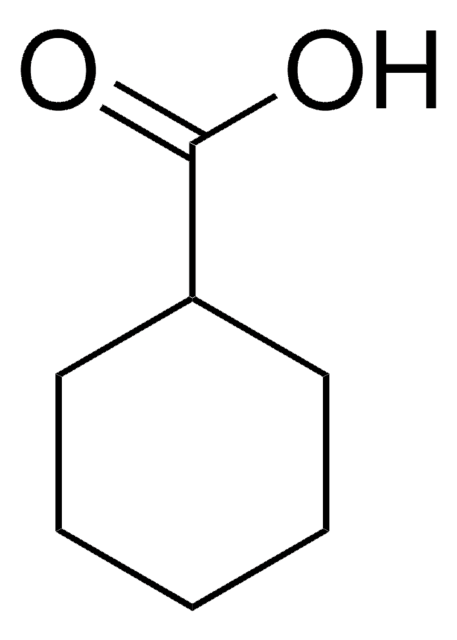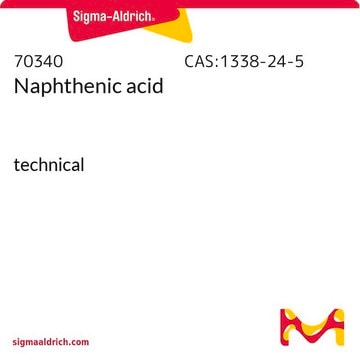Alle Fotos(1)
Wichtige Dokumente
P37602
5-Phenylvaleriansäure
99%
Synonym(e):
5-Phenylpentansäure
Anmeldenzur Ansicht organisationsspezifischer und vertraglich vereinbarter Preise
Alle Fotos(1)
About This Item
Lineare Formel:
C6H5CH2CH2CH2CH2COOH
CAS-Nummer:
Molekulargewicht:
178.23
Beilstein:
2049062
EG-Nummer:
MDL-Nummer:
UNSPSC-Code:
12352100
PubChem Substanz-ID:
NACRES:
NA.22
Empfohlene Produkte
Qualitätsniveau
Assay
99%
Form
crystals
bp
177-178 °C/13 mmHg (lit.)
mp (Schmelzpunkt)
58-60 °C (lit.)
SMILES String
OC(=O)CCCCc1ccccc1
InChI
1S/C11H14O2/c12-11(13)9-5-4-8-10-6-2-1-3-7-10/h1-3,6-7H,4-5,8-9H2,(H,12,13)
InChIKey
BYHDDXPKOZIZRV-UHFFFAOYSA-N
Suchen Sie nach ähnlichen Produkten? Aufrufen Leitfaden zum Produktvergleich
Lagerklassenschlüssel
11 - Combustible Solids
WGK
WGK 3
Flammpunkt (°F)
Not applicable
Flammpunkt (°C)
Not applicable
Persönliche Schutzausrüstung
Eyeshields, Gloves, type N95 (US)
Hier finden Sie alle aktuellen Versionen:
Besitzen Sie dieses Produkt bereits?
In der Dokumentenbibliothek finden Sie die Dokumentation zu den Produkten, die Sie kürzlich erworben haben.
Kunden haben sich ebenfalls angesehen
D M Chung et al.
International journal of biological macromolecules, 29(4-5), 243-250 (2001-11-24)
From a set of mixed carbon sources, 5-phenylvaleric acid (PV) and octanoic acid (OA), polyhydroxyalkanoic acid (PHA) was separately accumulated in the two pseudomonads Pseudomonas putida BM01 and Pseudomonas citronellolis (ATCC 13674) to investigate any structural difference between the two
I-Ching Ho et al.
International journal of biological macromolecules, 40(2), 112-118 (2006-08-22)
PHAs (poly-3-hydroxyalkanoates) obtained by Pseudomonas oleovorans grown with mixed carbon sources were investigated. Mixed carbon sources were sodium octanoate/undecylenic acid and sodium octanoate/5-phenylvaleric acid. Effect of carbon source in pre-culture on PHAs structure was investigated. Main fermentation was conducted with
Marie-Paule Gonthier et al.
Free radical biology & medicine, 35(8), 837-844 (2003-10-15)
Procyanidins are major dietary polyphenols made of elementary flavan-3-ol (epi)catechin units. They have antioxidant properties and may contribute to health benefits in humans, but little is known about their metabolic fate. We compared here the metabolism of procyanidin dimer B3
Christopher Jewell et al.
Drug metabolism and disposition: the biological fate of chemicals, 35(11), 2015-2022 (2007-08-01)
The capacity of human, minipig, and rat skin and liver subcellular fractions to hydrolyze the anesthetic ester procaine was compared with carboxylesterase substrates 4-methylumbelliferyl-acetate, phenylvalerate, and para-nitrophenylacetate and the arylesterase substrate phenylacetate. Rates of procaine hydrolysis by minipig and human
I Calis et al.
Journal of natural products, 62(8), 1101-1105 (1999-09-10)
(3R)-O-beta-D-Glucopyranosyloxy-5-phenylvaleric acid (1), (3R)-O-beta-D-glucopyranosyloxy-5-phenylvaleric acid n-butyl ester (2), and a new dihydrochalcone diglycoside 4'-O-[beta-D-glucopyranosyl-(1-->6)-glucopyranosyl]oxy-2'-hydroxy-3', 6'-dimethoxydihydrochalcone (3), together with six known flavonoid glycosides [kaempferol-3-O-beta-D-glucopyranoside (= astragalin) (4), kaempferol-3-O-beta-D-galactopyranoside (5), quercetin-3-O-beta-D-glucopyranoside (= isoquercitrin) (6), quercetin-3-O-beta-D-galactopyranoside (= hyperoside) (7), quercetin-3-O-(2''-O-galloyl)-beta-D-glucopyranoside (8), and quercetin-3-O-beta-D-glucuronopyranoside
Unser Team von Wissenschaftlern verfügt über Erfahrung in allen Forschungsbereichen einschließlich Life Science, Materialwissenschaften, chemischer Synthese, Chromatographie, Analytik und vielen mehr..
Setzen Sie sich mit dem technischen Dienst in Verbindung.
















